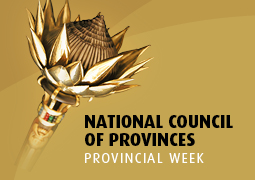
Free State’s permanent delegates to the NCOP with their Free State Legislature counterparts turned their attention today to Matjhabeng Municipality in Welkom which has been inundated by community protests, and subjected to adverse findings by the South African Human Rights Commission and the Office of the Public Protector over its inability to deal with raw sewer that is spilling into homes and flowing into wetlands and leaving a stench of smell that pose health hazard to many of its communities.
A sad state of affairs that is attributed to a combination of various inefficiencies from water and sanitation infrastructures that are nearing their design limits, vandalism, theft, security breaches and poor maintenance of wastewater treatment plants meant to provide its communities with clean water and lack of planned maintenance for its sanitation network systems.
So bad is the situation in this municipality that the Department of Water and Sanitation made a direct intervention to avoid a total collapse of its bulk water and sanitation infrastructures.
The delegation in conjunction went to visit this municipality to seek answers from its Executive Mayor, Mr Thanduxolo Khalipha. The Chief Whip of the NCOP, Mr Seiso Mohai, who is part of the delegation wanted to know what the municipality’s skills audit say about its capability to turn the situation around.
He prefaced his reply by stating that much of the rot currently dogging this municipality happened before he took over the reins in 2021. He conceded though that part of the major problem they are faced with is that many people who occupied critical service delivery positions were not competent to be in those positions. As such, he said much of the municipality’s critical services were outsourced to consultants at a huge cost to its coffers.
He cited a chilling example: “We had an official in the Supply Chain Management who had grade 12, in the presence of qualified consultants that were rendered dormant by previous incumbents.” This was so because there were elements in the previous executive who were bent on defrauding the municipality.
“We have compiled a report of their transgressions and we have reported them to the Special Investigation Unit and Hawks to investigate them and bring them to book.” He continued: “We have also discovered that there were many people who were in our payroll but were sleeping on duty. As a result, 90% of their work was done by service providers.”
The mayor who was part of the previous Mayoral Committee of the municipality, was asked why this municipality was not declared a provincial disaster given the extent of problems with which it was faced. He replied: “I am of the view that the Department of Cooperative Governance and Traditional Affairs should have reported this matter to the Cabinet and compel it to declare its situation a provincial disaster so that it could get the necessary assistance to alleviate it from the disaster it is currently faced with.”
The delegation wanted to know what the new executive did upon assuming the reigns and whether was there any strategic turn around plans in place to right the wrongs of the past administration. The mayor was emphatic that when they took over the municipality, it was in an intensive care unit.
After the mayor’s presentation, the delegation went on site visits to see the progress made in fixing the bulk water and sanitation infrastructure. The delegation was not pleased to see that some water treatment plants were either not properly fenced or had no security on site to curb vandalism and theft. While work on other plants has not yet commenced or properly scoped. This contradicted some aspects of the report presented to the delegation by Bloemfontein Water Board, the Department of Water and Sanitation and the municipality.
The delegation urged them to have a coordinated plan of action to streamline their respective interventions to ensure they are able to address the water and sanitation service delivery backlogs this municipality is inundated with currently. On the other hand, to ensure that there’s a plan in place to maintain the existing water and sanitation networks to avoid the total collapse of these bulk infrastructures that are critical to the economic viability of the municipality.
By Abel Mputing
14 September 2023

